Pope Francis


Catholic environmental groups from around the world on Jan. 14 announced a new global network to battle climate change just as many Catholic conservatives are sharply criticizing Pope Francis’ campaign to put environmental protection high on the church’s agenda.
“We are certain that anthropogenic (human-made) climate change endangers God’s creation and us all, particularly the poor, whose voices have already spoken of the impacts of an altered climate,” the new Global Catholic Climate Movement says in its mission statement.
“Climate change is about our responsibility as God’s children and people of faith to care for human life, especially future generations, by caring for all of God’s wondrous creation,” the statement continues.
The GCCM said it intends to push for international treaties to battle global warming but said it is approaching the issue from a moral and biblical perspective and hopes to “encourage the conversion of hardened hearts.”
That could be a tall order in light of current arguments over climate change in U.S. politics and in the American church.

While baptizing 33 babies in the Sistine Chapel on Jan. 11, Pope urged mothers to breast-feed their infants if they were hungry.
“Mothers, give your children milk — even now,” Francis said. “If they cry because they are hungry, breast-feed them, don’t worry.”
The pope departed from his prepared text, which included the phrase “give them milk,” and inserted the Italian term “allattateli,” which means “breast-feed them.”
The celebration took place to mark the day Jesus was baptized by John the Baptist in the waters of the Jordan River.
Francis also asked the parents gathered to remember the poor mothers around the world.
“Let us thank the Lord for the gift of milk, and we pray for those mothers — there are so many, unfortunately — who are not able to give their children food to eat,” he said.
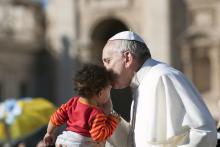
JOURNALIST Elisabetta Piqué was reporting for Argentina’s La Nacion from a conflict zone in Gaza when her phone rang. On the line was her friend, Padre Jorge. He knew Piqué, a war correspondent, was somewhere bombs were falling. He wanted to pray with her.
Piqué had known Argentina’s Catholic Cardinal Jorge Bergoglio since 2001. “He knew me first as a war correspondent,” Piqué told me when we met on a warm October afternoon in the courtyard of Hotel Helix in Washington, D.C. An affectionate friendship developed. Bergoglio even baptized her two children. Her new book, Pope Francis: Life and Revolution, investigates the history, passions, mistakes, humility, courage, and spiritual maturity of the man her friend has become.
In the rush to publish biographies of the new pope, some (see Paul Vallely’s Pope Francis: Untying the Knots) tout Bergoglio’s conversion from careful, benevolent, autocrat to radical, somewhat careless, lover of the poor. Piqué categorically challenges this portrayal. “He is a person who has been consistent all his life,” she says, “not somebody that suddenly became like that now. The theories that he had a conversion are totally nonsense and without any basis. He was always a sensitive person toward suffering.”
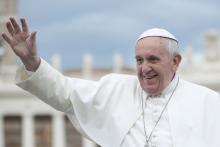
Pope Francis reinforced his radical reshaping of the Catholic Church by naming 20 new cardinals from countries as far afield as Ethiopia, Tonga, Thailand, and Panama.
The clerics – who come from 18 different countries – include 15 who are eligible to vote for the pope’s successor in a future conclave, and five retired bishops and archbishops “distinguished for their pastoral charity” who are over age 80 and ineligible to select the next pontiff.
Dissatisfied with the slow pace of change in Rome, Francis’ appointments reflect his desire for “pastors on the front line of difficult situations,” one Vatican observer said, who can bring a new perspective from the often overlooked outposts of global Christianity.
The Vatican’s chief spokesman, the Rev. Federico Lombardi, said the choices showed the pope’s most important criteria was “universality,” and indicated he was not “chained to tradition” as he moves the balance of power at the highest levels of the church closer to the developing world.
It is the first time ever that cardinals have been selected from Tonga, Myanmar, and Cape Verde to become “princes of the church.” There are only five Europeans included among the 15 new electors – two from Italy and three others from Corsica, Spain, and Portugal. The United States was shut out for the second time in a row.

Pope Francis nominated 15 new cardinals Jan. 4 from 14 different nations but leaving several leading U.S. archbishops off the list.
Speaking to a crowd gathered in St. Peter’s Square, the pontiff named each cardinal, noting they came from every continent and “show the indelible tie with the church of Rome to churches in the world.” At least three are from nations that have never had a church member in the role.
Five of the cardinals come from Europe, three from Asia, three from Latin America, and two each from Africa and Oceania.
The nations of Cape Verde, Tonga, and Myanmar received their first cardinals ever, Vatican spokesman Fr. Federico Lombardi said in a statement.
1. Here Is What Happens When Each Myers-Briggs Personality Type Makes A New Year’s Resolution
These may or may not be scarily accurate...
2. The Birth of a New Civil Rights Movement
“The shattering events of 2014, beginning with Michael Brown’s death in Ferguson, Missouri, in August, did more than touch off a national debate about police behavior, criminal justice and widening inequality in America. In 2014, the new social justice movement became a force that the political mainstream had to reckon with.”
3. 10 Resolutions for 2015
“We often only use the word in the context of this season, but “resolution” is a nuanced noun. Some of its definitions include: A firm decision to do or not to do something; the quality of being determined or resolute; the action of solving a problem, dispute, or contentious matter. In a world of seemingly endless conflicts, I sure like the sound of that. We need more of all of these qualities just now in this brand new year.”
4. The Tragedy of the American Military
“The American public and its political leadership will do anything for the military except take it seriously. The result is a chickenhawk nation in which careless spending and strategic folly combine to lure America into endless wars it can’t win.”

VATICAN CITY — Pope Francis launched a blistering attack on the Vatican bureaucracy on Monday, outlining a “catalog of illnesses” that plague the church’s central administration, including “spiritual Alzheimer’s” and gossipy cliques.
The pope’s traditional Christmas greeting to the cardinals, bishops and priests who run the Holy See was more “Bah! Humbug!” than holiday cheer as he ticked off a laundry list of “ailments of the Curia” that he wants to cure.
In a critique that left many of the assembled clerics clearly uncomfortable, the 15 ailments in Francis’ “catalog of illnesses” reflected the take-no-prisoners approach he promised when he was elected nearly two years ago as an outsider with little direct experience in Rome.
“The Curia is called upon to improve itself, always improve itself and grow in communion, holiness and knowledge to fully realize its mission,” the pope said.
“Yet like every body, like every human body, it is exposed to illnesses, malfunctioning, infirmity. They are illnesses and temptations that weaken our service to God.”
In a separate address to Vatican staff later, Francis begged pardon for the “shortcomings” of senior church leaders, as well as the “several scandals” that had “caused so much harm,” without specifying which scandals he had in mind.
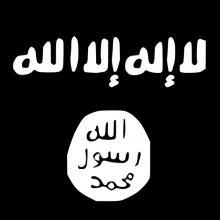
For most of recorded history, Isis was an Egyptian goddess, a benevolent type who cared for widows and orphans, cured the sick and even brought the dead back to life.
This year, the world met the other ISIS.
The rise of the so-called Islamic State, variously known as ISIS or ISIL, dominated headlines in 2014 as a self-proclaimed caliphate sowed death and destruction across Iraq and Syria. For some, the group confirmed their worst fears about Muslim extremists, bent on killing religious minorities and subjugating women in a quest for domination that included leveling villages and beheading hostages.
The terror wrought by the Islamic State reflected a sense of turbulence that upended international news in 2014. But it was not the only source of unrest. The Ebola virus in west Africa put the world on edge, and a bloody war between Israelis and Palestinians in Gaza, kidnapped schoolgirls in Nigeria and the slaughter of more than 100 children at a military school in Pakistan added to the mix.
At home, America wrestled with police brutality as grand juries declined to prosecute officers in the deaths of unarmed black men in Ferguson, Mo., and New York City. From botched prison executions to a stream of desperate migrant children flooding America’s southern border, things felt troubled, disorienting, always on the verge of breaking apart.
Religion played a large role in those stories, and in other major headlines from 2014:
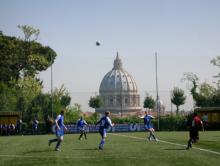
Major sporting events could be held at the Vatican if Rome wins its bid to host the Summer Olympics in 2024.
Pope Francis, a keen soccer fan, is reported to be enthusiastic about the idea. He is expected to meet the head of Italy’s National Olympic Committee, Giovanni Malago, and other officials at the Vatican on Dec. 19 after a Mass to commemorate the committee’s 100th anniversary
Cardinal Jose Saraiva Martins, former head of the Congregation for the Causes of Saints, said he believed Francis would back plans to hold events such as archery in the Vatican gardens.
He told the Florence daily La Nazione that events could also be staged at the pope’s summer palace at Castel Gandolfo outside Rome.
“It seems like a good idea, I think the pope will approve,” Saraiva Martins said.
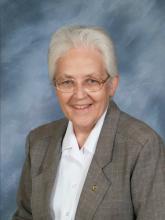
The moment was more “Kumbaya” than “Come to Jesus” on Dec. 16 as the Vatican released the much-anticipated results of an investigation of women’s religious communities in the U.S., the first of two controversial investigations of American nuns by the Roman Curia.
The 5,200-word report was largely positive, and participants at a Vatican news conference were even more effusive in their praise for each other, the process, the outcome, and prospects for future collaboration to meet serious challenges. That was a big change from how things started six years ago.
So what did we learn from this whole saga? Here are three takeaways:
1. Rome’s “War on Women” is over
“It is not a truce,” Sister Sharon Holland of the Leadership Conference of Women Religious, the main network of U.S. nuns, told reporters in Rome. “We are not at war.”

The Vatican announced Dec. 11 that Pope Francis will name a new batch of cardinals in February, adding to the select group of churchmen who will someday gather to elect his successor.
Rome won’t reveal the names until next month, but could an American be among them?
There are a number of factors that will govern the choices, and thus the predictions:
First, there are 208 cardinals in the College of Cardinals, but at the age of 80 a cardinal is no longer allowed to vote in a conclave. That leaves 112 cardinals under the age of 80, as of now, though two more will age out in February and another two in March and April.
The customary ceiling on the number of electors today is 120 (it has changed many times over the centuries). That means that Francis could give a so-called red hat to 10 or 12 bishops.
The pope could also raise the ceiling, or ignore it, as Saint John Paul II often did during his long reign.
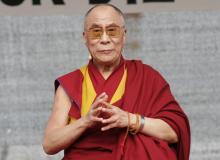
The Dalai Lama said Dec. 11 that he would not meet Pope Francis while in Rome for a summit of Nobel Peace Prize winners.
“The Vatican administration says it is not possible because it could cause problems,” the Dalai Lama said, hinting that the Vatican may be unwilling to irk China, a country with which it wants to engage and perhaps re-establish diplomatic relations.
But the Vatican’s chief spokesman, the Rev. Federico Lombardi, declined to say whether the pope had personally turned down a request for a meeting with the spiritual leader of the Tibetan Buddhists.
“Pope Francis obviously holds the Dalai Lama in very high regard, but he will not be meeting any of the Nobel laureates,” Lombardi told journalists.

When Pope Francis this month wanted to highlight his appointment of several women to a blue-ribbon theological commission, he called the female theologians “strawberries on the cake.”
Yikes.
Two weeks earlier, when the pontiff gave a speech to the European Parliament, he used another lady-based analogy, this time underscoring the continent’s demographic decline and cultural crisis by comparing Europe to a grandmother who is “no longer fertile and vibrant.”
Ouch.
Yes, Francis is a veritable quote machine, tossing off-the-cuff bon mots that the public finds enormously appealing in large part because they are coming from a Roman pontiff — not an office known for its improv routines.
But when he speaks about women, Francis can sound a lot like the (almost) 78-year-old Argentine churchman that he is, using analogies that sound alternately condescending and impolitic, even if well-intentioned.
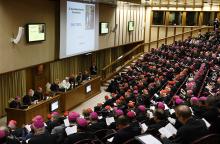
Pope Francis used his weekly audience Dec. 10 to challenge media reports of “clashes between factions” at the recent bishops’ synod on family issues.
“Some of you have asked me if the synod fathers fought,” Francis said. “I don’t know if they ‘fought,’ but they spoke forcefully. This is freedom. This is just the kind of freedom that there is in the church.”
In a bid to set the record straight, the pope acknowledged the extensive media coverage of the global gathering in October and likened it to “sports or political coverage.”
“They often spoke of two teams, pro and con, conservatives and liberals,” the pope told thousands of pilgrims in St. Peter’s Square.
“There was no clash between factions … but a dialogue between the bishops, which came after a long process of preparation and now continues, for the good of the family, the church, and society. It’s a process.”

Gay marriage was never on the agenda at the recent Bishops’ Synod on the Family and the subject “did not cross our minds,” Pope Francis said in a new headline-grabbing interview.
Keeping to a format that has become a favorite for this pope, Francis used a high-profile interview to shed light on his thinking, and Vatican policies, on a number of hot-button social issues.
In an interview published Dec. 7, Francis told the Argentine daily, La Nacion, that the Catholic Church must help parents support their gay children. At the same time, he maintained that allowing, condoning or even adapting to same-sex marriage was still not on the church’s agenda.
This was one of several controversial issues he broached in the interview with papal biographer Elisabetta Pique:

Was there a secret plot to elect Cardinal Jorge Mario Bergoglio at the papal conclave last year?
Did Bergoglio — who became Pope Francis at that conclave — give the go-ahead to such a plan?
And does that campaign call his election, and his papacy, into question?
Such questions might sound like plot twists to a new Vatican thriller by Dan Brown, but they are actually the latest talking points promoted by some Catholic conservatives upset with the direction that Francis is leading the church.
The furor stems from a behind-the-scenes account of the March 2013 conclave, presented in a new book about Francis titled “The Great Reformer: Francis and the Making of a Radical Pope.”
In the last chapter of the biography, which focuses on Bergoglio’s early life in Argentina and career as a Jesuit, author Austen Ivereigh delivers an insider account of how a group of cardinals who wanted a reformer pope quietly sought to rally support for Bergoglio in the days leading up to the conclave.
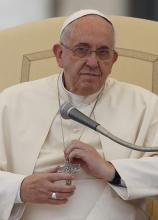
Pope Francis and religious leaders from Jewish, Muslim, Hindu and other faiths came together at the Vatican on Dec. 2 to call for an end to slavery by 2020.
At a ceremony in which they signed a declaration to that effect, the pope joined the head of the Anglican Communion, Archbishop of Canterbury Justin Welby, and representatives of Ecumenical Patriarch Bartholomew I and the grand imam of Egypt’s Al-Azhar Mosque, Ahmed Muhammad Ahmed el-Tayeb.
The leaders said it was a “human and moral imperative” to wipe out human trafficking, forced labor, prostitution, and organ trafficking. It also committed the signatories to do all they could to free the estimated 35 million people enslaved across the world.
“Modern slavery … fails to respect the fundamental conviction that all people are equal and have the same freedom and dignity,“ the joint statement said.
“We pledge ourselves here today to do all in our power, within our faith communities and beyond, to work together for the freedom of all those who are enslaved and trafficked so that their future may be restored.”

Never mind that Turkey is overwhelmingly Muslim. The most enduring image of Pope Francis’ three-day visit to Turkey was the moment when he bowed his head and asked for the blessing of the leader of Eastern Orthodoxy, Ecumenical Patriarch Bartholomew I.
Since his election last year, Francis and Bartholomew have forged a strong alliance culminating in their joint pledge in Istanbul on Nov. 30 to work to bridge a 1,000-year divide between their churches.
The task takes on new urgency as Christians — Catholic, Protestant and Orthodox — face a wave of violent persecution in Syria and Iraq.
The 77-year-old Argentinian pope represents 1.2 billion Roman Catholics and the Turkish-born Bartholomew leads about 250 million Eastern Orthodox Christians.
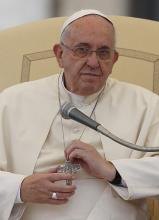
The 77-year-old pontiff is well-known for his attacks on consumerism and for his compassion for the poor. More recently, Francis has turned his attention to bioethics issues, describing abortion, embryonic stem cell research, and euthanasia as “playing with life” and “a sin against God.”
But this was the first time he has delivered his message on the floor of the parliament of the European Union, which represents 500 million people across 28 countries.
As the first non-European pope to hold the office in almost 1,300 years, Francis also appeared less willing to continue the Roman Catholic Church’s traditionally unconditional support for the EU.
As the impact of the stifling economic crisis is being felt in European countries like France and Italy, Francis attacked the EU for a dearth of leadership, saying its ideals had become weighed down by bureaucracy.
“The great ideals that inspired Europe seem to have lost their power of attraction, in favor of the bureaucratic, technical emphasis of its institutions,” the pope said.